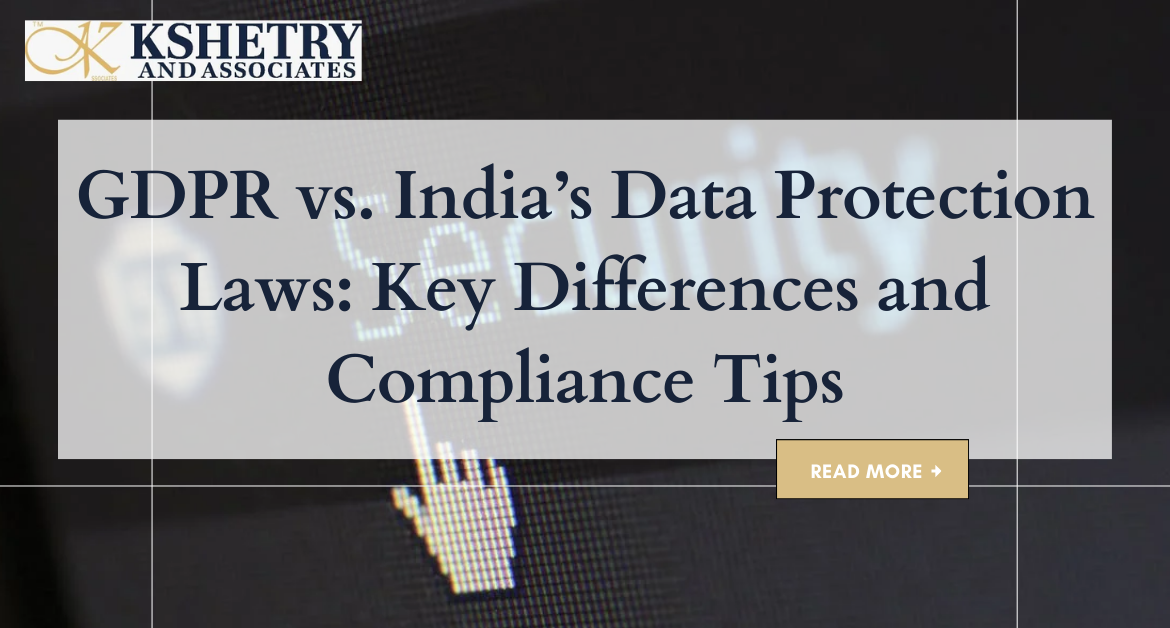With the increasing emphasis on data privacy worldwide, understanding the distinctions between the European Union’s General Data Protection Regulation (GDPR) and India’s data protection framework is essential for businesses operating in both regions. While GDPR has set the global benchmark for data privacy standards, India’s evolving data protection laws, particularly the Digital Personal Data Protection Act, 2023 (DPDPA), aim to address data protection within the country. This blog explores the key differences between GDPR and India’s data protection laws and provides practical compliance tips for businesses.
Overview of GDPR and India’s Digital Personal Data Protection Act
GDPR: The General Data Protection Regulation (GDPR), which came into effect on May 25, 2018, is one of the most stringent data protection laws globally. It applies to all organizations handling the personal data of EU citizens, regardless of the organization’s location. GDPR emphasizes transparency, user consent, data minimization, and accountability.
Digital Personal Data Protection Act, 2023 (DPDPA): The DPDPA is India’s response to the growing need for comprehensive data protection legislation. The Act aims to protect personal data, ensure the rights of individuals, and facilitate the lawful processing of personal data for various purposes. It focuses on establishing clear rules for data collection, storage, processing, and protection within India.
Key Differences Between GDPR and India’s DPDPA
1. Scope of Application
- GDPR: This applies to all entities (controllers and processors) that process the personal data of EU residents, even if the processing takes place outside the EU.
- DPDPA: Applies to entities processing digital personal data within India, as well as those processing data outside India if such processing is related to offering goods or services to Indian data principals.
2. Definition of Personal Data
- GDPR: Defines personal data broadly, including any information relating to an identified or identifiable natural person.
- DPDPA: Focuses on ‘digital personal data,’ emphasizing information collected in digital form or converted to digital form. This narrows the definition compared to GDPR.
3. Data Processing Principles
- GDPR: Establishes six key principles for data processing—lawfulness, fairness, transparency, purpose limitation, data minimization, accuracy, storage limitation, and integrity and confidentiality.
- DPDPA: Outlines similar principles but places more emphasis on ‘data minimization’ and ‘purpose limitation’. The Act requires data fiduciaries to process personal data only for specific purposes and to store data for as long as necessary for those purposes.
4. User Rights
- GDPR: Grants comprehensive rights to data subjects, including the right to access, rectify, erase (right to be forgotten), restrict processing, data portability, and object to processing.
- DPDPA: Also provides similar rights, such as the right to access, correction, and erasure. However, the right to data portability and the right to object are less explicitly defined compared to GDPR.
5. Legal Basis for Processing
- GDPR: Requires data processing to be justified under one of six lawful bases: consent, contract performance, legal obligation, vital interests, public task, or legitimate interests.
- DPDPA: Primarily focuses on consent as the lawful basis for processing but allows processing without consent for specific legitimate purposes, such as public interest or in compliance with the law.
6. Penalties for Non-Compliance
- GDPR: Imposes severe penalties for non-compliance, with fines of up to €20 million or 4% of the annual global turnover, whichever is higher.
- DPDPA: Specifies a maximum penalty of INR 250 crores (approximately €30 million) for significant breaches. While substantial, these fines are generally lower than those under GDPR.
7. Data Protection Officers (DPOs)
- GDPR: Mandates the appointment of a Data Protection Officer (DPO) for organizations engaged in large-scale monitoring or processing of sensitive data.
- DPDPA: This does not explicitly require the appointment of a DPO but encourages entities to implement necessary safeguards to ensure compliance.
Compliance Tips for Businesses
1. Conduct a Data Audit: Both GDPR and DPDPA require organizations to know what data they collect, process, and store. Conduct a thorough audit to identify personal data sources, processing activities, and storage locations.
2. Update Privacy Policies: Ensure that your privacy policies are transparent, clear, and compliant with both regulations. Include details on data collection, purposes of processing, user rights, and how individuals can exercise their rights.
3. Strengthen Consent Mechanisms: Consent must be informed, specific, and freely given. Implement mechanisms that allow users to provide explicit consent and withdraw it easily.
4. Implement Data Protection Safeguards: Adopt security measures such as encryption, anonymization, and regular vulnerability assessments to protect personal data from unauthorized access.
5. Educate Your Team: Training employees on data protection principles and compliance requirements is essential to ensure that the organization meets regulatory standards.
6. Monitor Cross-Border Data Transfers: If your business transfers data across borders, ensure compliance with GDPR’s data transfer rules and DPDPA’s requirements, including adequacy decisions and data protection agreements.
7. Prepare for Data Breach Notifications: Both regulations mandate timely data breach notifications. Develop a protocol for identifying, reporting, and mitigating data breaches within the stipulated timeframes (72 hours under GDPR).
Conclusion
While GDPR and India’s DPDPA share common goals of protecting personal data and empowering individuals with rights over their information, they differ in scope, definitions, and enforcement. Businesses operating in both jurisdictions need to adopt a robust compliance strategy that aligns with the stringent requirements of GDPR and the emerging framework of India’s DPDPA. For expert legal guidance on navigating these regulations, Kshetry And Associates offer specialized services tailored to your business needs.
Also Read: Calcutta High Court Grants Bail to Gouri Das, Drug Lord’s Wife Amid Legal Controversy

